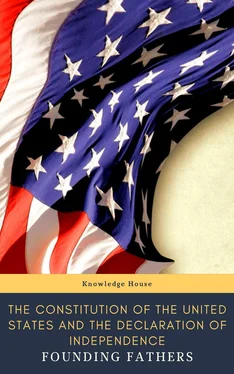PUBLIUS.
FEDERALIST VII:
The Same Subject Continued: Concerning Dangers From Dissensions Between the States
Table of Contents
To the People of the State of New York:
It is sometimes asked, with an air of seeming triumph, what inducements could the States have, if disunited, to make war upon each other? It would be a full answer to this question to say–precisely the same inducements which have, at different times, deluged in blood all the nations in the world. But unfortunately for us, the question admits of a more particular answer. There are causes of differences within our immediate contemplation, of the tendency of which, even under the restraints of a Fœderal Constitution, we have had sufficient experience, to enable us to form a judgment of what might be expected, if those restraints were removed.
Territorial disputes have at all times been found one of the most fertile sources of hostility among nations. Perhaps the greatest proportion of wars that have desolated the earth have sprung from this origin. This cause would exist, among us, in full force. We have a vast tract of unsettled territory within the boundaries of the United States. There still are discordant and undecided claims between several of them; and the dissolution of the Union would lay a foundation for similar claims between them all. It is well known, that they have heretofore had serious and animated discussions concerning the right to the lands which were ungranted at the time of the Revolution, and which usually went under the name of crown-lands. The States, within the limits of whose colonial Governments they were comprised, have claimed them as their property; the others have contended that the rights of the crown in this article devolved upon the Union; especially as to all that part of the Western territory which, either by actual possession, or through the submission of the Indian proprietors, was subjected to the jurisdiction of the King of Great Britain, till it was relinquished in the treaty of peace. This, it has been said, was at all events an acquisition to the Confederacy by compact with a foreign power. It has been the prudent policy of Congress to appease this controversy, by prevailing upon the States to make cessions to the United States for the benefit of the whole. This has been so far accomplished as, under a continuation of the Union, to afford a decided prospect of an amicable termination of the dispute. A dismemberment of the Confederacy, however, would revive this dispute, and would create others on the same subject. At present, a large part of the vacant Western territory is, by cession at least, if not by any anterior right, the common property of the Union. If that were at an end, the States which made the cession, on a principle of Fœderal compromise, would be apt, when the motive of the grant had ceased, to reclaim the lands as a reversion. The other States would no doubt insist on a proportion, by right of representation. Their argument would be, that a grant, once made, could not be revoked; and that the justice of their participating in territory acquired or secured by the joint efforts of the Confederacy, remained undiminished. If, contrary to probability, it should be admitted by all the States, that each had a right to a share of this common stock, there would still be a difficulty to be surmounted, as to a proper rule of apportionment. Different principles would be set up by different States for this purpose; and as they would affect the opposite interests of the parties, they might not easily be susceptible of a pacific adjustment.
In the wide field of Western territory, therefore, we perceive an ample theatre for hostile pretensions, without any umpire or common judge to interpose between the contending parties. To reason from the past to the future, we shall have good ground to apprehend, that the sword would sometimes be appealed to as the arbiter of their differences. The circumstances of the dispute between Connecticut and Pennsylvania, respecting the land at Wyoming, admonish us not to be sanguine in expecting an easy accommodation of such differences. The articles of confederation obliged the parties to submit the matter to the decision of a Fœderal Court. The submission was made, and the Court decided in favor of Pennsylvania. But Connecticut gave strong indications of dissatisfaction with that determination; nor did she appear to be entirely resigned to it, till, by negotiation and management, something like an equivalent was found for the loss she supposed herself to have sustained. Nothing here said is intended to convey the slightest censure on the conduct of that State. She no doubt sincerely believed herself to have been injured by the decision; and States, like individuals, acquiesce with great reluctance in determinations to their disadvantage.
Those who had an opportunity of seeing the inside of the transactions, which attended the progress of the controversy between this State and the district of Vermont, can vouch the opposition we experienced, as well from States not interested, as from those which were interested in the claim; and can attest the danger to which the peace of the Confederacy might have been exposed, had this State attempted to assert its rights by force. Two motives preponderated in that opposition: one, a jealousy entertained of our future power; and the other, the interest of certain individuals of influence in the neighboring States, who had obtained grants of lands under the actual Government of that district. Even the States which brought forward claims, in contradiction to ours, seemed more solicitous to dismember this State, than to establish their own pretensions. These were New Hampshire, Massachusetts, and Connecticut. New Jersey and Rhode Island, upon all occasions, discovered a warm zeal for the independence of Vermont; and Maryland, till alarmed by the appearance of a connection between Canada and that place, entered deeply into the same views. These being small States, saw with an unfriendly eye the perspective of our growing greatness. In a review of these transactions we may trace some of the causes, which would be likely to embroil the States with each other, if it should be their unpropitious destiny to become disunited.
The competitions of commerce would be another fruitful source of contention. The States less favorably circumstanced would be desirous of escaping from the disadvantages of local situation, and of sharing in the advantages of their more fortunate neighbors. Each State, or separate confederacy, would pursue a system of commercial policy peculiar to itself. This would occasion distinctions, preferences, and exclusions, which would beget discontent. The habits of intercourse, on the basis of equal privileges, to which we have been accustomed from the earliest settlement of the country, would give a keener edge to those causes of discontent than they would naturally have, independent of this circumstance. We should be ready to denominate injuries those things which were in reality the justifiable acts of independent sovereignties consulting a distinct interest. The spirit of enterprise, which characterizes the commercial part of America, has left no occasion of displaying itself unimproved. It is not at all probable that this unbridled spirit would pay much respect to those regulations of trade, by which particular States might endeavor to secure exclusive benefits to their own citizens. The infractions of these regulations on one side, the efforts to prevent and repel them on the other, would naturally lead to outrages, and these to reprisals and wars.
The opportunities which some States would have of rendering others tributary to them, by commercial regulations, would be impatiently submitted to by the tributary States. The relative situation of New York, Connecticut, and New Jersey, would afford an example of this kind. New York, from the necessities of revenue, must lay duties on her importations. A great part of these duties must be paid by the inhabitants of the two other States in the capacity of consumers of what we import. New York would neither be willing, nor able to forego this advantage. Her citizens would not consent that a duty paid by them should be remitted in favor of the citizens of her neighbors; nor would it be practicable, if there were not this impediment in the way, to distinguish the customers in our own markets. Would Connecticut and New Jersey long submit to be taxed by New York for her exclusive benefit? Should we be long permitted to remain in the quiet and undisturbed enjoyment of a metropolis, from the possession of which we derived an advantage so odious to our neighbors, and, in their opinion, so oppressive? Should we be able to preserve it against the incumbent weight of Connecticut on the one side, and the coöperating pressure of New Jersey on the other? These are questions that temerity alone will answer in the affirmative.
Читать дальше












